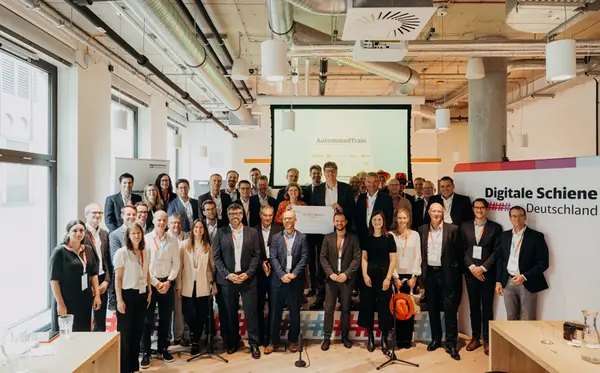
July 5, 2023, Berlin. The “AutomatedTrain" research and development project enables more flexible use of trains through driverless driving. Two regional trains equipped with state-of-the-art sensor technology. German government to fund project with around 42.6 million euros.
As part of the Digitale Schiene Deutschland (Digital Rail Germany) initiative, Deutsche Bahn (DB) is working with Siemens Mobility, Bosch and other partners to drive forward the digital rail operations of the future. In the "AutomatedTrain" research and development project, the group will be testing fully automated provisioning and stabling of trains over the next three years. Intelligent sensor technology will enable the vehicles to recognize their surroundings and react independently to obstacles - comparable to autonomous driving on the road. The German Federal Ministry of Economics and Climate Protection is supporting the project. Parliamentary State Secretary Michael Kellner presented a funding decision for around 42.6 million euros in Berlin today.
By 2026, one train from Siemens Mobility and one train from the Stuttgart S-Bahn will be equipped as prototypes. The Mireo Smart Train from Siemens Mobility will cover the distance from the stabling facility to the first station fully automatically and without a driver. In the event of obstacles, the vehicle will brake automatically. In addition, the fully automated upgrading and downgrading ("up and down") of the train will also be tested. In addition, the second train collects data for obstacle detection, among other things. Both vehicles will be equipped with the same hardware but with different software solutions. This allows the recorded sensor data and the software's reactions to special incidents to be compared with each other.
Dr. Daniela Gerd tom Markotten, DB Board Member for Digitalization and Technology: "With innovative technology and state-of-the-art sensor systems, we can make an important contribution to more traffic on climate-friendly rail. Fully automated, driverless driving will enable us to operate our trains more frequently and flexibly in the future and thus offer our passengers an even more attractive service."
Michael Kellner, Parliamentary State Secretary to the Federal Minister of Economics and Climate Protection: "AutomatedTrain will be the first to demonstrate the technical feasibility of fully automated driving in an open rail system. The cooperation between the rail industry and Deutsche Bahn AG will define a modular and open system architecture for fully automated driving. This will lay a further foundation stone for fully automated driving in Germany as an industrial and research location."
Andre Rodenbeck, CEO Rail Infrastructure at Siemens Mobility: "For the first time in Germany, we are testing fully automated, driverless driving based on ETCS in regional transport. That's why we are proud to be part of the 'AutomatedTrain' research and development project. We are equipping one of our Mireo Smart regional trains with the latest GoA4 technology for train preparation and provisioning. Hereby we continue our research and development activities on driverless trains and obstacle detection around rail transport. We thank the German Federal Ministry of Economics and Climate Protection for supporting the project."
Dr. Ing. Frank Schmidt, Managing Director of Bosch Engineering GmbH: "Fully automated driving has great potential for rail traffic. We are contributing our expertise in the field of sensor technology and environment recognition. The aim is to locate the position of trains reliably and with track accuracy and to enable automated approach and departure. To do this, it is important to record the course of the track in real time and detect potential obstacles located in front of the vehicle."
A total of ten companies from different industries are working together on the project: DB Netz AG, Bosch Engineering GmbH, Codewerk GmbH, DB Regio AG, duagon Germany GmbH, IAV GmbH, ITK Engineering GmbH, Red Hat GmbH, Siemens Mobility GmbH and the Technical University of Dresden. The results of the project are to be presented at InnoTrans, the international trade fair for rail and transport technology, in 2026.
The project is co-funded by the EU (European Build-up and Resilience Facility).